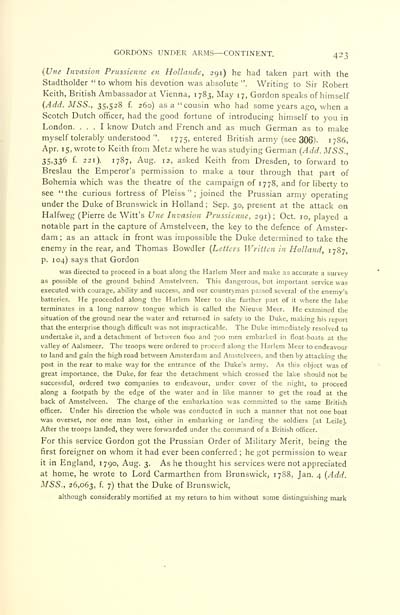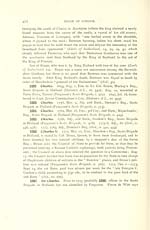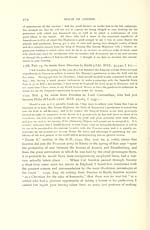New Spalding Club > House of Gordon > Gordons under arms
(513) Page 423
Download files
Complete book:
Individual page:
Thumbnail gallery: Grid view | List view

GORDONS UNDER ARMS — ^CONTINENT.
423
(Utie Invasion Pnissienne en Hollandc, 291) he had taken part with the
Stadtholder " to whom his devotion was absolute ". Writing to Sir Robert
Keith, British Ambassador at Vienna, 1783, May 17, Gordon speaks of himself
(Add. MSS., 35,528 f. 260) as a "cousin who had some years ago, when a
Scotch Dutch officer, had the good fortune of introducing himself to you in
London. ... I know Dutch and French and as much German as to make
myself tolerably understood ". 1775, entered British army (see 306). 1786,
Apr. 15, wrote to Keith from Metz where he was studying German (Add. MSS.,
35.336 f. 221). 1787, Aug. 12, asked Keith from Dresden, to forward to
Breslau the Emperor's permission to make a tour through that part of
Bohemia which was the theatre of the campaign of 1778, and for liberty to
see "the curious fortress of Pleiss " ; joined the Prussian army operatino-
under the Duke of Brunswick in Holland; Sep. 30, present at the attack on
Halfweg (Pierre de Witt's Une Invasion Pnissienne, 291) ; Oct. 10, played a
notable part in the capture of Amstelveen, the key to the defence of Amster-
dam ; as an attack in front was impossible the Duke determined to take the
enemy in the rear, and Thomas Bowdler (Letters Written in Holland, 1787,
p. 104) says that Gordon
was directed to proceed in a boat along the Harlem Meer and make as accurate a survey
as possible of the ground behind Amstelveen. This dangerous, but important service was
executed with courage, ability and success, and our countryman passed several of the enemy's
batteries. He proceeded along the Harlem Meer to the further part of it where the lake
terminates in a long narrow tongue which is called the Nieuve Meer. He examined the
situation of the ground near the water and returned in safety to the Duke, making his report
that the enterprise though difficult was not impracticable. The Duke immediately resolved to
undertake it, and a detachment of between 600 and 700 men embarked in float-boats at the
valley of Aalsmeer. The troops were ordered to proceed along the Harlem Meer to endeavour
to land and gain the high road between Amsterdam and Amstelveen, and then by attacking the
post in the rear to make way for the entrance of the Duke's army. As this object was of
great importance, the Duke, for fear the detachment which crossed the lake should not be
successful, ordered two companies to endeavour, under cover of the night, to proceed
along a footpath by the edge of the water and in like manner to get the road at the
back of Amstelveen. The charge of the embarkation was committed to the same British
officer. Under his direction the whole was conducted in such a manner that not one boat
was overset, nor one man lost, either in embarking or landing the soldiers [at Leile].
After the troops landed, they were forwarded under the command of a British officer.
For this service Gordon got the Prussian Order of Military Merit, being the
first foreigner on whom it had ever been conferred ; he got permission to wear
it in England, 1790, Aug. 3. As he thought his services were not appreciated
at home, he wrote to Lord Carmarthen from Brunswick, 1788, Jan. 4 (Add.
MSS., 26,063, f. 7) that the Duke of Brunswick,
although considerably mortified at my return to him without some distinguishing mark
423
(Utie Invasion Pnissienne en Hollandc, 291) he had taken part with the
Stadtholder " to whom his devotion was absolute ". Writing to Sir Robert
Keith, British Ambassador at Vienna, 1783, May 17, Gordon speaks of himself
(Add. MSS., 35,528 f. 260) as a "cousin who had some years ago, when a
Scotch Dutch officer, had the good fortune of introducing himself to you in
London. ... I know Dutch and French and as much German as to make
myself tolerably understood ". 1775, entered British army (see 306). 1786,
Apr. 15, wrote to Keith from Metz where he was studying German (Add. MSS.,
35.336 f. 221). 1787, Aug. 12, asked Keith from Dresden, to forward to
Breslau the Emperor's permission to make a tour through that part of
Bohemia which was the theatre of the campaign of 1778, and for liberty to
see "the curious fortress of Pleiss " ; joined the Prussian army operatino-
under the Duke of Brunswick in Holland; Sep. 30, present at the attack on
Halfweg (Pierre de Witt's Une Invasion Pnissienne, 291) ; Oct. 10, played a
notable part in the capture of Amstelveen, the key to the defence of Amster-
dam ; as an attack in front was impossible the Duke determined to take the
enemy in the rear, and Thomas Bowdler (Letters Written in Holland, 1787,
p. 104) says that Gordon
was directed to proceed in a boat along the Harlem Meer and make as accurate a survey
as possible of the ground behind Amstelveen. This dangerous, but important service was
executed with courage, ability and success, and our countryman passed several of the enemy's
batteries. He proceeded along the Harlem Meer to the further part of it where the lake
terminates in a long narrow tongue which is called the Nieuve Meer. He examined the
situation of the ground near the water and returned in safety to the Duke, making his report
that the enterprise though difficult was not impracticable. The Duke immediately resolved to
undertake it, and a detachment of between 600 and 700 men embarked in float-boats at the
valley of Aalsmeer. The troops were ordered to proceed along the Harlem Meer to endeavour
to land and gain the high road between Amsterdam and Amstelveen, and then by attacking the
post in the rear to make way for the entrance of the Duke's army. As this object was of
great importance, the Duke, for fear the detachment which crossed the lake should not be
successful, ordered two companies to endeavour, under cover of the night, to proceed
along a footpath by the edge of the water and in like manner to get the road at the
back of Amstelveen. The charge of the embarkation was committed to the same British
officer. Under his direction the whole was conducted in such a manner that not one boat
was overset, nor one man lost, either in embarking or landing the soldiers [at Leile].
After the troops landed, they were forwarded under the command of a British officer.
For this service Gordon got the Prussian Order of Military Merit, being the
first foreigner on whom it had ever been conferred ; he got permission to wear
it in England, 1790, Aug. 3. As he thought his services were not appreciated
at home, he wrote to Lord Carmarthen from Brunswick, 1788, Jan. 4 (Add.
MSS., 26,063, f. 7) that the Duke of Brunswick,
although considerably mortified at my return to him without some distinguishing mark
Set display mode to: Large image | Transcription
Images and transcriptions on this page, including medium image downloads, may be used under the Creative Commons Attribution 4.0 International Licence unless otherwise stated. ![]()
| Publications by Scottish clubs > New Spalding Club > House of Gordon > Gordons under arms > (513) Page 423 |
|---|
| Permanent URL | https://digital.nls.uk/79786853 |
|---|
| Description | Volumes 47-53 are uniform with but not part of the club's series. |
|---|---|

